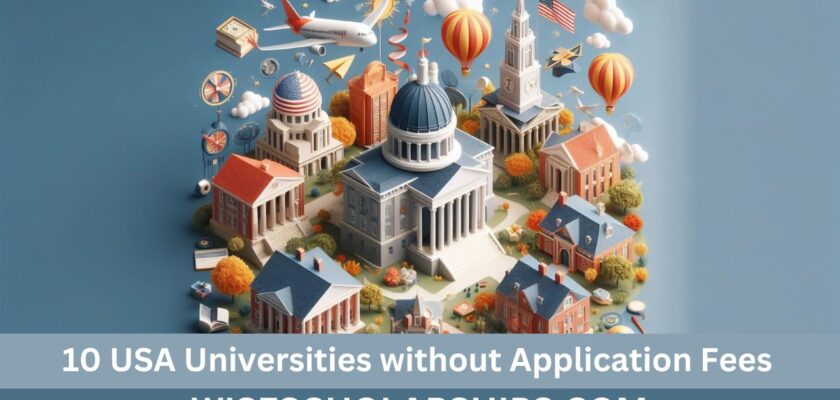Initiating on the journey toward higher education can be both exciting and daunting, especially considering the associated costs of the application process. Application fees can quickly accumulate, posing a financial barrier for prospective students.
Fortunately, several American colleges have chosen to alleviate this burden by waiving application fees. This post will explore a list of U.S. institutions that offer this benefit, providing crucial information to assist prospective students in their decision-making process.
Understanding the Importance of Application Fees in USA Universities
Before delving into the list of universities that waive application fees, it’s crucial to understand the role of these fees in the broader context of higher education. Universities impose application fees to cover administrative expenses related to the application processing procedure.
While these costs are non-refundable and can vary widely, they may pose a significant challenge for certain students, particularly those from low-income families. In recognition of this financial barrier, several U.S. institutions have opted to eliminate application fees. Beyond providing opportunities for a diverse range of students, this inclusivity demonstrates a commitment to promoting equitable possibilities in education.
List of Universities in the USA Without Application Fees
1. Case Western Reserve University (CWRU)
- Location: Cleveland, Ohio
- Notable Features: Academic brilliance, cutting-edge research, multidisciplinary studies.
- Waiver Details: Application fees are waived for domestic applicants.
2. Colby College
- Location: Waterville, Maine
- Notable Features: Private liberal arts college, challenging academic courses.
- Waiver Details: Application fees are waived for both local and international candidates.
3. Grinnell College
- Location: Grinnell, Iowa
- Notable Features: Emphasis on community involvement and social responsibility.
- Waiver Details: Application fees are waived to make academic programs accessible.
4. Rice University
- Location: Houston, Texas
- Notable Features: Renowned for diversity, creativity, and research.
- Waiver Details: Application fees are waived for domestic students applying for financial help.
5. Wellesley College
- Location: Wellesley, Massachusetts
- Notable Features: Private liberal arts college for women, strong emphasis on women’s leadership.
- Waiver Details: Application costs are waived to foster an inclusive learning community.
6. Kenyon College
- Location: Gambier, Ohio
- Notable Features: Private liberal arts college, the rich legacy of literary and artistic inquiry.
- Waiver Details: Application fees are eliminated to remove financial obstacles.
7. Carleton College
- Location: Northfield, Minnesota
- Notable Features: Private liberal arts college, experiential learning, and academic rigor.
- Waiver Details: Application costs are waived to advance educational access.
8. Sewanee: The University of the South
- Location: Sewanee, Tennessee
- Notable Features: Private university, dedication to intellectual inquiry.
- Waiver Details: Application fees are abolished to provide access to a distinctive educational experience.
9. Reed College
- Location: Portland, Oregon
- Notable Features: Private liberal arts college, focus on intellectual exploration.
- Waiver Details: Application fees are waived for domestic students requesting financial help.
10. St. John’s College
- Locations: Santa Fe, New Mexico, and Annapolis, Maryland
- Notable Features: Excellent literature curriculum, commitment to classical education.
- Waiver Details: Application costs are eliminated for an affordable and unique education.
In the United States, the college experience can be life-changing, and navigating the application process is often the first step. For many prospective students, application fees pose a significant barrier. The universities on this list have taken commendable steps to lessen this burden by waiving application fees. By providing comprehensive information on U.S. universities without application costs, we aim to empower students to make informed decisions about their educational futures. These institutions actively work to make higher education in the U.S. more inclusive and accessible, facilitating the growth of individuals and society through education.


